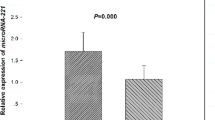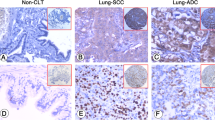Abstract
The aim of this study was to detect MAC30 expression in human non-small cell lung cancer (NSCLC) and to analyze its association with prognosis of NSCLC patients. Quantitative real-time RT-PCR was performed to examine the expression of MAC30 mRNA in 20 cases of NSCLC and corresponding non-tumor tissue samples. Immunohistochemistry was performed to detect the expression of MAC30 in 95 NSCLC tissues. We found that the expression levels of MAC30 mRNA in NSCLC tissues were significantly higher than those in corresponding non-tumor tissues. High-level MAC30 expression was correlated with poor tumor differentiation, TNM stage, and lymph node metastasis. Patients with high expression levels of MAC30 showed lower overall survival rate than those with low expression levels. Multivariate analysis showed that high MAC30 protein expression was an independent prognostic factor for NSCLC patients. Our study suggests that over-expression of MAC30 may play an important role in the progression of NSCLC and MAC30 expression may offer a valuable marker for predicting the outcome of patients with NSCLC.



Similar content being viewed by others
References
Jemal A, Siegel R, Ward E, Hao Y, Xu J, Murray T, et al. Cancer statistics, 2008. CA Cancer J Clin. 2008;58:71–96. doi:10.3322/CA.2007.0010.
Kamangar F, Dores GM, Anderson WF. Patterns of cancer incidence, mortality, and prevalence across five continents: defining priorities to reduce cancer disparities in different geographic regions of the world. J Clin Oncol. 2006;24:2137–50. doi:10.1200/JCO.2005.05.2308.
Murphy M, Pykett MJ, Harnish P, Zang KD, George DL. Identification and characterization of genes differentially expressed in meningiomas. Cell Growth Differ. 1993;4:715–22.
Malhotra K, Luehrsen KR, Costello LL, Raich TJ, Sim K, Foltz L, et al. Identification of differentially expressed mRNAs in human fetal liver across gestation. Nucleic Acids Res. 1999;27:839–47.
Kayed H, Kleeff J, Ding J, Hammer J, Giese T, Zentgraf H, et al. Expression analysis of MAC30 in human pancreatic cancer and tumors of the gastrointestinal tract. Histol Histopathol. 2004;19:1021–31.
Potapova O, Anisimov SV, Gorospe M, Dougherty RH, Gaarde WA, Boheler KR, et al. Targets of c-Jun NH(2)-terminal kinase 2-mediated tumor growth regulation revealed by serial analysis of gene expression. Cancer Res. 2002;62:3257–63.
Sobin LH, Fleming ID. Union Internationale Contre le Cancer and the American Joint Committee on Cancer. TNM classification of malignant tumors, fifth edition. Cancer. 1997;80:1803–4.
Livak KJ, Schmittgen TD. Analysis of relative gene expression data using real-time quantitative PCR and the 2(−Delta Delta C(T)) method. Methods. 2001;25:402–8.
Kelly K, Crowley J, Bunn Jr PA, Presant CA, Grevstad PK, Moinpour CM, et al. Randomized phase III trial of paclitaxel plus carboplatin versus vinorelbine plus cisplatin in the treatment of patients with advanced non-small-cell lung cancer: a Southwest Oncology Group trial. J Clin Oncol. 2001;19:3210–8.
Hennessy BT, Hanrahan EO, Daly PA. Non-Hodgkin lymphoma: an update. Lancet Oncol. 2004;5:341–53.
Xiao M, Li H, Yang S, Huang Y, Jia S, Wang H, et al. Expression of MAC30 protein is related to survival and clinicopathological variables in breast cancer. J Surg Oncol. 2012. doi:10.1002/jso.23269.
Zhao ZR, Zhang LJ, He XQ, Zhang ZY, Zhang F, Li F, et al. Significance of mRNA and protein expression of MAC30 in progression of colorectal cancer. Chemotherapy. 2011;57:394–401.
Yan BY, Wang DW, Zhu ZL, Yang YH, Wang MW, Cui DS, et al. Overexpression of MAC30 in the cytoplasm of oral squamous cell carcinoma predicts nodal metastasis and poor differentiation. Chemotherapy. 2010;56(6):424–8.
Zhang ZY, Zhao ZR, Adell G, Jarlsfelt I, Cui YX, Kayed H, et al. Expression of MAC30 in rectal cancers with or without preoperative radiotherapy. Oncology. 2006;71:259–65.
Moparthi SB, Arbman G, Wallin A, Kayed H, Kleeff J, Zentgraf H, et al. Expression of MAC30 protein is related to survival and biological variables in primary and metastatic colorectal cancers. Int J Oncol. 2007;30(1):91–5.
Acknowledgments
This work was funded by research grants from Project of Education Department of Heilongjiang Province (no. 12521z021 and 11521096), China
Conflicts of interest
None
Author information
Authors and Affiliations
Corresponding author
Additional information
Kai-Yu Han and Xin Gu contributed to this paper equally.
Rights and permissions
About this article
Cite this article
Han, KY., Gu, X., Wang, HR. et al. Overexpression of MAC30 is associated with poor clinical outcome in human non-small-cell lung cancer. Tumor Biol. 34, 821–825 (2013). https://doi.org/10.1007/s13277-012-0612-z
Received:
Accepted:
Published:
Issue Date:
DOI: https://doi.org/10.1007/s13277-012-0612-z




